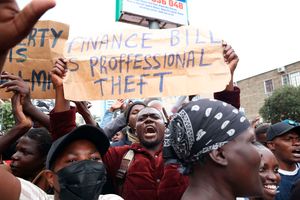Alcoholic Beverages Association of Kenya decry advance excise duty proposal

East African Breweries Limited Group Corporate Relations Director Eric Kiniti and Alcoholic Beverages Association of Kenya (ABAK) chairman Eric Githua (L) during a press conference on the proposed Excise Duty (Excisable Goods Management System) (Amendment) Regulations 2023 on February 14, 2023.
The Alcoholic Beverages Association of Kenya (ABAK) has voiced its opposition to the proposal by the government to compel them to pay excise duty within 24 hours upon removal of goods from the stockroom.
The policy adjustment is in the controversial Finance Bill 2023, which has already obtained parliamentary approval and is only awaiting presidential assent.
ABAK says the move, which it alleges was not subjected to public participation, will punish innocent players, spurring the production of illicit alcohol, rather than curb it.
ABAK chairman Eric Githua said the provision in the Finance Bill was unnecessary, noting that the current model, where manufacturers remit tax after the reconciliation of sales, is working.
“Our members have remained compliant in remitting excise duty, playing their part in building Kenya’s economy even in the current tough economic times,” he said.
“Implementing the advance payment effectively is a counterproductive, unperceptive move that will hurt legal manufacturers devastatingly and benefit illicit alcohol dealers who do not pay taxes, anyway.”
The Parliamentary Committee on Finance and National Planning picked up the proposal following submissions by the Illicit Alcohol Prevention Task Force. However, ABAK said the Kuria Kimani-led team ought to have taken views from industry players.
The manufacturers argue since excise duty is a consumption tax and they are mere collection agents for the final consumers, the enactment of the Bill would negate the objective of levying the duty as brewers would incur a cost that the consumers should pay.
“If the proposal is enacted, manufacturers will be required to review the contracts they have with their distribution networks, including outlets such as bars and restaurants, to require upfront payment on all orders to sustain compliance by alcoholic manufacturers,” said ABAK in a statement.
“This will strain the value chain as the immediate cash requirements will not sustain the value chain distribution networks.”
The government has in recent weeks gone hammer and tongs on a crackdown on rampant trade of illicit alcohol in the country, with Deputy President Rigathi Gachagua leading the offensive.
Last week, the DP gave administrators and security chiefs in the upper eastern region 10 days to slay the dragon of illicit liquor and drug cartels failure to which they would lose their jobs.





